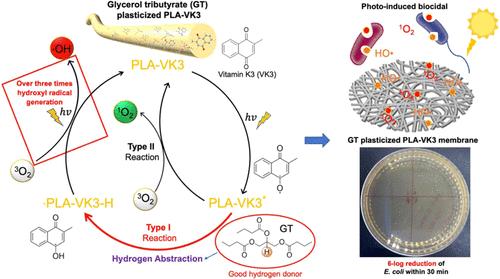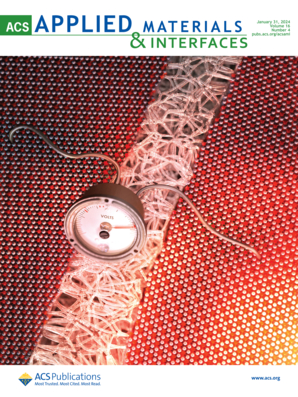增强光诱导抗菌、机械和生物降解性能的聚乳酸纤维膜的协同改性
IF 8.2
2区 材料科学
Q1 MATERIALS SCIENCE, MULTIDISCIPLINARY
引用次数: 0
摘要
具有增强抗菌和机械功能的可重复使用和可生物降解的口罩被认为是可持续的个人防护装备(PPE),可保护公众免受未来传染病爆发或大流行的影响。本研究成功地将生物基增塑剂与可食用光敏剂维生素K3 (VK3)结合,在聚乳酸(PLA)纤维上提供所需的机械、生物降解和抗菌功能。这些添加剂与VK3和PLA表现出良好的相容性,从而提高了改性PLA膜的柔软性和韧性,并加速了酶降解。在增塑剂中,三丁酸甘油(GT)通过促进激发的VK3的I型光反应,在日光(D65)和UVA照射下产生的羟基自由基比其他增塑剂多三倍,并产生一致的单线态氧,从而显示出与PLA膜中VK3的优越协同效应。PLA膜上活性氧(ROS)产生的显著增加导致了快速的抗菌功能(30分钟内大肠杆菌减少6对数),这是生物杀灭材料的关键性能指标。这些发现为开发环保、多功能、可降解的口罩材料提供了新的见解,为未来可持续和杀菌剂PPE提供了一条有希望的途径。本文章由计算机程序翻译,如有差异,请以英文原文为准。

Synergistic Modification of Polylactic Acid Fibrous Membranes with Improved Light-Induced Antibacterial, Mechanical, and Biodegradable Performances
Reusable and biodegradable facemasks with enhanced antibacterial and mechanical functions are considered sustainable personal protective equipment (PPE) to protect the public from future outbreaks or pandemics of infectious diseases. This study successfully employed biobased plasticizers to inherently work with an edible photosensitizer vitamin K3 (VK3) to provide a combination of desired mechanical, biodegradable, and antibacterial functions onto polylactide (PLA) fibers. These additives demonstrated good compatibility with VK3 and PLA, resulting in improved softness and toughness and accelerated enzymatic degradation of the modified PLA membranes. Among the plasticizers, glycerol tributyrate (GT) revealed a superior synergistic effect with VK3 in PLA membranes by promoting a type I photoreaction of the excited VK3, which generated more than three times hydroxyl radicals compared to other plasticizers under both daylight (D65) and UVA irradiation, in addition to the consistent production of singlet oxygen. The dramatically increased reactive oxygen species (ROS) production on the PLA membranes leads to rapid antibacterial function (6-log reduction of Escherichia coli within 30 min), a critical performance metric for biocidal materials. These findings offer new insights into the development of eco-friendly, multifunctional, and degradable facemask materials, providing a promising approach for future sustainable and biocidal PPE.
求助全文
通过发布文献求助,成功后即可免费获取论文全文。
去求助
来源期刊

ACS Applied Materials & Interfaces
工程技术-材料科学:综合
CiteScore
16.00
自引率
6.30%
发文量
4978
审稿时长
1.8 months
期刊介绍:
ACS Applied Materials & Interfaces is a leading interdisciplinary journal that brings together chemists, engineers, physicists, and biologists to explore the development and utilization of newly-discovered materials and interfacial processes for specific applications. Our journal has experienced remarkable growth since its establishment in 2009, both in terms of the number of articles published and the impact of the research showcased. We are proud to foster a truly global community, with the majority of published articles originating from outside the United States, reflecting the rapid growth of applied research worldwide.
 求助内容:
求助内容: 应助结果提醒方式:
应助结果提醒方式:


